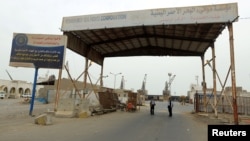United Nations aid agencies are renewing appeals to Yemen's warring parties to spare the Port of Hodeidah, warning attacks against the vital lifeline would be catastrophic.
The United Nations warns that Yemen, where the world's worst humanitarian crisis is unfolding, would suffer even more if the vital Port of Hodeidah were attacked and ceased to operate.
More than three years of civil war have destroyed the country's economy, forced more than two million people to flee their homes and made 22 million people or 75 percent of the population dependent upon international aid for their survival.
Around 80 percent of Yemen's food and medicine is imported through the Port of Hodeidah. Jens Laerke is Spokesman for the U.N. Organization for the Coordination of Humanitarian Affairs or OCHA. He said fuel and other essential humanitarian relief also arrive via the port.
"OCHA warns that sustained hostilities in Hodeidah city, interruptions to the port operations, which are critical for vital imports of food and fuel or a siege of the city would be catastrophic. There is no contingency plan that can effectively protect civilians from the humanitarian consequences if the conflict escalates further. The response capacity of international organizations on the ground would quickly be overwhelmed," he said.
To further complicate matters, the World Health Organization warns the country may be on the brink of another major cholera epidemic. WHO emergency response chief, Peter Salama told VOA essential medications needed to fight this fatal disease are imported through the Port of Hodeidah.
"So, for humanitarian perspective, but also for commercial perspective, the Al Hodeidah port is absolutely central to the survival of the civilian population in Yemen.So, any attacks on that port are something that would lead to catastrophic consequences," he said.
The United Nations reports more than 28,000 Yemenis either have been killed or injured since March 2015. That was when Saudi Arabia began bombing Houthi rebels in support of the government. The U.N. attributes the majority of the 9,500 civilian deaths to airstrikes.




